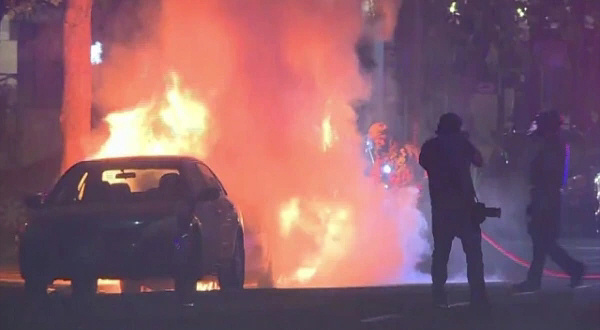

Where Did New Gun Owners Come
From and Where are They Going?

Mostly peaceful riots in Portland
By Rob Morse. Nov 25, 2023
Article Source
Our society is changing. Those changes caused many of us to buy a firearm. We see that crime is rising around us. We notice that criminals are no longer routinely caught by police and prosecuted in the courts. We consider moving to a safer location. (examples from California and New York) We decided that we need a gun to be safe. That chain of events might sound like mere speculation but a number of recent surveys have confirmed it. Almost 14 million of us bought a gun for the first time in 2020 and 2021. The increase in gun ownership will not lead to a significant change in political affiliation.
Personal protection is the main reason we buy a gun today. By a two-to-one margin, more of us think crime is getting worse rather than getting better. The margin increases to three-to-one when we consider crime in our inner cities. Those opinions come from a Harvard-Harris poll conducted only a few weeks ago in mid-November of 2023. Democrats think the increase in crime is because of a worsening economy while republicans think it is because criminals are not prosecuted for their crimes. Most republicans think that the police are afraid to do their job while most democrats disagree. By a four-to-one margin, voters in both parties think that laws about minor crimes like shoplifting should be rigorously enforced. Except for democrats, a majority of us blame woke democrat politicians and district attorneys who won't prosecute crimes. Most of us think that the US justice department is focused on politics rather than stopping gangs and crime syndicates.
A majority of voters from both parties now think that it is necessary to own a gun for personal protection. Including independent voters, 63-percent of us now believe it is necessary to own a gun to prevent criminal attacks.
We acted on those personal motivations and gun ownership has grown over time. We've seen record gun sales for the last 50 months. We also have mixed data on the number of new gun owners. A Pew research poll from August said that 41 percent of us live in a household with a firearm. That estimate may be on the low side since a Gallup poll put the number at 44 percent. A recent NBC poll put the number at 52% of us who live with a gun in our home. The variance between different polling organizations are significant, but the trend of increased gun ownership is consistent.
We have to be skeptical about these polling numbers. A recent research report said that many of us don't tell the truth to strangers on the phone when the strangers ask if we own firearms. The research report estimated that as many as 60 percent of adults might own a gun as compared to 30 percent reported earlier.
That is another part of our changing society. It now makes sense that we are reluctant to tell strangers whether we do or do not own firearms. Gun owners don't want to be targeted and have their guns taken. Households without a gun feel more vulnerable if they admit they are disarmed. All of us have become more concerned about having our personal information gathered and sold. In addition, the precise details of the polling question are critically important.
Let me give a practical example to prove my point. My first auto accident was a dented fender on my parent's car. My worst auto accident was as a passenger. I wouldn't mention either of those accidents if you asked me about accidents where I was driving my car. The same situation applies to gun owners as applied to drivers. Many older teenagers and younger adults depend on using someone else's firearm for protection when they are at home. Likewise, a husband or wife might carry a gun that is actually owned by their spouse.
It is undeniably true that the face of gun ownership is changing. The stereotypical gun owner used to be an old, white, rural male. That face is now a young, urban female minority. In short, gun ownership now represents the population at large. The older stereotype of gun owners was that they were politically conservative. It does not follow that new gun owners will follow suit and vote republican.
Gun ownership is unlikely to change voting patterns. Party affiliation is a stronger predictor of attitude towards firearm regulation than is gun ownership. In general, republicans who don't own a gun are slightly closer to democrats. Democrats who own a gun are slightly closer to republicans. That said, the difference between the political parties is larger than the difference between gun owners and non-gun owners within the parties.
Owning a firearm is only one of many cultural differences that separate liberal politics from conservative politics. Given the Democrat party's recent adoption of firearms prohibition, most liberal gun owners ignore their party's position on guns and vote for liberal candidates anyway.
As usual, change happens at the margin. A centrist democrat who recently bought a gun may now see the Democrat party's gun prohibitions as the issue that changed his vote.
I gave you 900 words and a lot of thought. If you found this worth reading, then please share it with a friend. RM
![]()
























